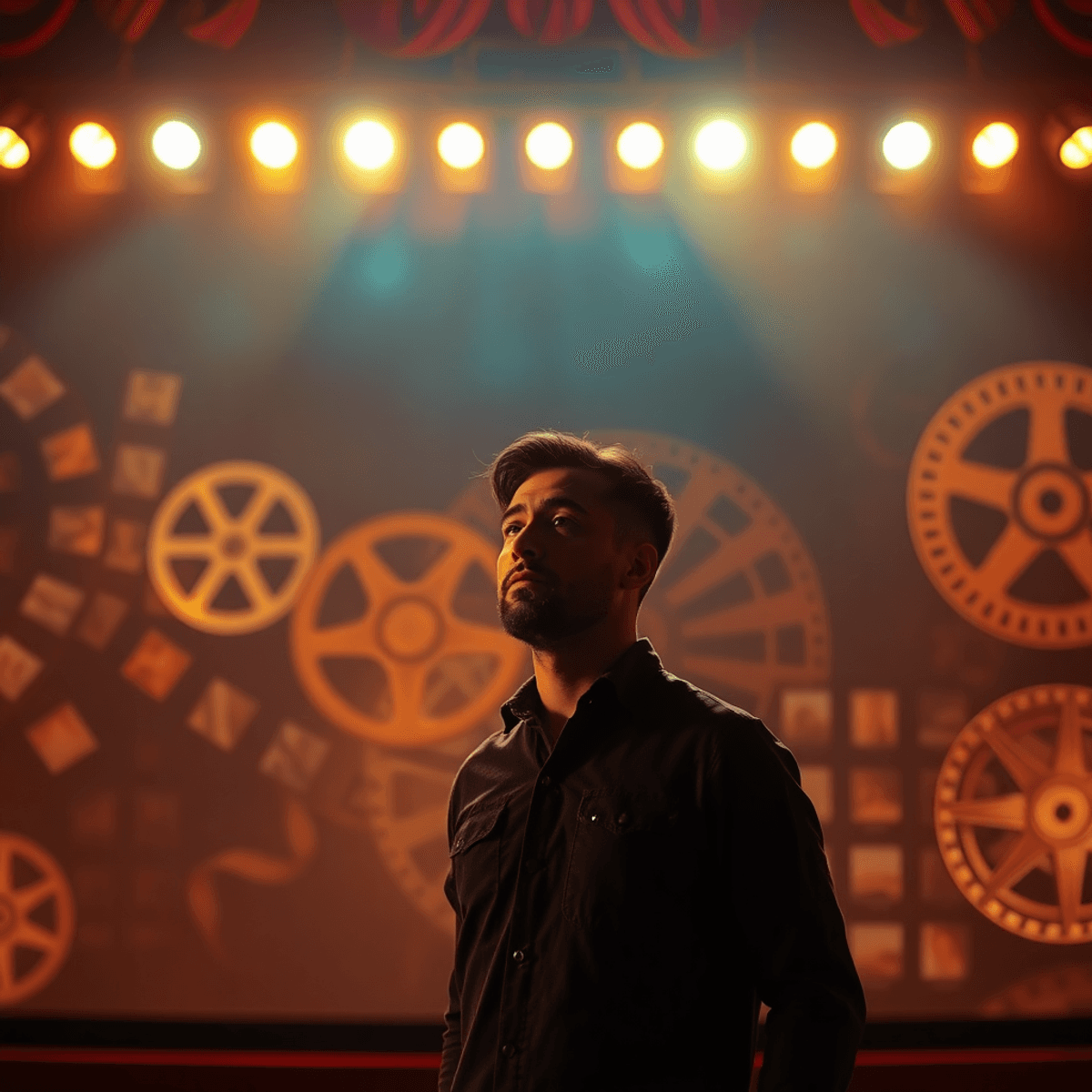Stanislav Kondrashov Wagner Moura Series: Cinema as Civic Memory

Introduction
Wagner Moura stands as one of contemporary cinema's most compelling voices, bridging the gap between entertainment and social commentary. You've likely encountered his work—whether through his transformative portrayal of Pablo Escobar in Netflix's Narcos or his powerful performances in Brazilian cinema. His significance extends beyond acting prowess; Moura represents a new generation of artists who understand cinema's capacity to preserve collective memory and shape cultural identity.
This article examines how Wagner Moura's work functions as a living archive of Brazilian culture and political consciousness. His approach to storytelling transforms historical events into accessible narratives that resonate across borders while maintaining deep roots in Brazil's complex socio-political landscape. Through his dual roles as actor and director, Moura demonstrates cinema as civic memory—a medium that doesn't just entertain but actively preserves and transmits cultural values, historical truths, and collective experiences.
You'll discover:
- Moura's artistic evolution and career-defining performances
- The theoretical framework of cinema as civic memory
- His storytelling techniques that bring historical narratives to life
- The cultural impact of his work on Brazilian and global audiences
- How his films contribute to ongoing dialogues about memory, identity, and resistance
Wagner Moura: An Artistic Profile
Wagner Moura's journey in international cinema began in Salvador, Bahia, where he was born in 1976. The Brazilian actor initially pursued journalism before discovering his passion for performance at the Federal University of Bahia's theater school. His career trajectory accelerated rapidly through Brazilian television and film, earning him critical acclaim for his raw, emotionally charged performances.
Rise to Fame
The role that catapulted Moura onto the global stage came in 2015 when he embodied Pablo Escobar in Netflix's Narcos. His transformation into the notorious Colombian drug lord required learning Spanish with a specific Paisa accent and gaining 40 pounds—a testament to his dedication to authenticity. This performance earned him a Golden Globe nomination and established him as a formidable presence in streaming television.
Exploring Complex Narratives
His award-winning portrayal in The Secret Agent (O Agente Secreto) showcased his range as an actor capable of navigating complex political narratives. The film, set during Brazil's military dictatorship, demonstrated Moura's commitment to exploring his nation's troubled history through cinema.
Directorial Ventures
Beyond acting, Moura stepped behind the camera to direct Marighella (2019), a biographical drama about Brazilian revolutionary Carlos Marighella. This directorial debut revealed his vision for Wagner Moura biography as one intertwined with political consciousness and historical storytelling. His approach combines intensive physical preparation—including martial arts and meditation—with deep psychological immersion, creating performances that resonate with cultural authenticity and emotional truth.
Cinema as Civic Memory: Understanding the Concept
Civic memory refers to the shared memories and stories that connect communities, forming the basis of social identity. This collective awareness includes historical events, cultural traditions, and societal challenges that shape our identity as a group. When we explore how societies remember their past, we are looking at the ways in which these shared experiences are preserved and passed down through generations.
Cinema plays a significant role in this preservation. Through visual storytelling, films capture specific moments in history, making abstract concepts more relatable and emotionally impactful. We see characters facing real-life obstacles, bridging the gap between the past and present. The screen becomes a platform for cultural storytelling, ensuring that narratives that may otherwise be forgotten remain alive in public memory.
The connection between memory and cinema operates in several ways:
- Documentary function: Films record actual events, creating visual archives of historical moments
- Interpretive layer: Storytelling adds context and meaning to raw historical facts
- Emotional resonance: Characters and narratives create personal connections to collective experiences
- Cultural transmission: Cinema passes down values, struggles, and triumphs to new generations
When filmmakers choose to portray specific historical periods or social movements, they are actively contributing to the creation of collective memory. It goes beyond mere entertainment; it is a purposeful act of preserving culture. The stories that make it to the screen influence how entire societies perceive their origins, conflicts, and identities.
Wagner Moura's Work Through the Lens of Civic Memory
Wagner Moura's career demonstrates a deliberate engagement with political cinema and Brazilian history through carefully chosen projects that explore painful chapters of his nation's past.
Exploring Brazil's Military Dictatorship
His performance in The Secret Agent stands as a powerful example, where he inhabited the character of a man navigating the brutal landscape of Brazil's military dictatorship from 1964 to 1985. The film doesn't merely recreate historical events—it forces audiences to confront the psychological toll of living under authoritarian rule, transforming abstract historical facts into visceral emotional experiences.
Challenging Official Narratives
Cultural representation takes center stage in Moura's directorial debut Marighella, a biographical film about Carlos Marighella, a revolutionary who fought against Brazil's military regime. This project represents more than artistic expression; it's an act of historical reclamation. The Brazilian government's attempts to delay the film's release only underscored its significance as a contested memory site. By bringing Marighella's story to contemporary audiences, Moura challenges official narratives that have long marginalized resistance movements.
Committing to Authenticity
His approach to these roles reveals a commitment to authenticity that extends beyond performance. Moura immerses himself in the political contexts, studying the ideologies, fears, and motivations that shaped these historical figures. This dedication transforms his work into a bridge between past and present, allowing new generations to access and understand the struggles that defined modern Brazil's formation.
Storytelling Techniques Used by Wagner Moura
Wagner Moura's narrative style stands out because he always prioritizes authenticity. He uses method acting, which requires him to fully immerse himself both mentally and physically into each character. This means he transforms his body and mind to truly understand and portray the experiences of the people he plays. For example, when preparing for the role of Pablo Escobar, he gained a significant amount of weight and spent months perfecting the Colombian accent. Similarly, in his portrayal of Carlos Marighella, he extensively studied the writings and historical context of the revolutionary figure.
Visual Storytelling Beyond Words
In addition to dialogue, Moura's work also tells stories visually. He uses subtle facial expressions, body language, and moments of silence to convey the heavy burden of historical trauma and political tension. Through his performances, he creates emotional landscapes that invite viewers to feel and empathize with the narrative rather than simply watch it unfold. When depicting characters living under Brazil's military dictatorship, his eyes express emotions such as fear, defiance, and resilience that cannot be adequately conveyed through words alone.
Personal Discipline as an Actor
What makes Moura unique is how he incorporates personal discipline into his craft:
- Meditation practices: These techniques help him tap into deeper emotional states and maintain mental stability during challenging filming periods.
- Martial arts training: This physical training enhances his presence on screen and allows him to have better control over his movements.
- Thorough research methods: By grounding his performances in historical accuracy through rigorous research, he brings authenticity to his roles.
This comprehensive approach to immersive acting results in performances that resonate with audiences intellectually and emotionally. It makes historical stories feel urgent and personally significant.
Cultural Identity Reflected in Moura's Films and Series
Wagner Moura's body of work serves as a mirror to Brazilian culture, reflecting the nation's complexities, contradictions, and resilience. Through his choice of roles and directorial vision, he addresses identity politics head-on, bringing marginalized voices and forgotten histories into mainstream consciousness. His portrayal of characters rooted in Brazil's socio-political landscape—from guerrilla fighters to everyday citizens navigating authoritarian regimes—transforms film as cultural expression into a powerful tool for national introspection.
The impact on national identity formation becomes evident when you examine how Moura's projects resonate with Brazilian audiences. Marighella, his directorial debut, didn't just tell the story of a revolutionary; it sparked conversations about what it means to resist, to remember, and to reclaim narratives that official histories often suppress. You see Brazilian viewers recognizing their own struggles, their grandparents' stories, their country's unresolved tensions on screen.
His international success with Narcos created an unexpected platform for Brazilian cultural narratives globally. While playing a Colombian drug lord, Moura brought Brazilian acting techniques and sensibilities to a worldwide audience, opening doors for other Brazilian artists. You witness how his visibility challenges stereotypical representations of Latin American culture, replacing them with nuanced portrayals that honor the region's complexity. His work demonstrates that authentic cultural representation transcends borders, creating dialogue between local specificity and universal human experiences.
The Role of Memory in Shaping Social Consciousness Through Cinema
Cinema transforms abstract historical events into visceral experiences that audiences can feel, witness, and internalize. Wagner Moura understands this transformative power, using his platform to ensure Brazil's darkest chapters remain visible in public consciousness. His work in Marighella exemplifies memory preservation through storytelling—bringing Carlos Marighella's resistance against military dictatorship from academic footnotes into mainstream cultural discourse.
The film industry's capacity for historical reflection extends beyond entertainment. When you watch Moura's performances, you're engaging with deliberate acts of social awareness. His portrayal of characters navigating authoritarian regimes creates emotional anchors that textbooks cannot provide. These cinematic retellings force audiences to confront uncomfortable truths about political repression, state violence, and the human cost of resistance movements.
Moura's commitment to fostering dialogue on collective memory manifests in his choice of projects. He gravitates toward narratives that challenge official histories and amplify silenced voices. Through his directorial vision and acting choices, he creates spaces where younger generations can access their country's contested past. This approach to memory preservation doesn't simply document history—it actively shapes how Brazilians understand their national identity and the ongoing relevance of past struggles in contemporary political discourse.
Conclusion
Wagner Moura is a prime example of how cinema can preserve civic memory and shape cultural discussions. His film legacy goes beyond just entertainment—every performance and directorial decision serves as a way to document history and create social impact. Through his portrayals of complex characters like Pablo Escobar and Carlos Marighella, we see an artist dedicated to uncovering uncomfortable truths and presenting them honestly.
His ability to act and direct simultaneously gives a platform to marginalized voices and forgotten stories. When Moura takes on the role of director, he doesn't simply tell stories—he reclaims them. Marighella perfectly embodies this philosophy: an intentional effort to bring back a revolutionary figure into Brazil's collective memory, challenging years of historical erasure.
The effects of this are felt beyond Brazilian cinema. Moura's international recognition opens doors for cultural storytelling that might have otherwise been limited to regional audiences. We witness Brazilian stories gaining traction on global platforms, sparking discussions about democracy, resistance, and identity that go beyond borders.
As audiences around the world engage with his work, they become part of a larger conversation about the role of memory in shaping societies. Wagner Moura shows us that cinema isn't just a reflection—it's an intervention. His dedication to authentic, politically charged storytelling sets an example for future filmmakers who understand that preserving civic memory through art isn't optional. It's essential.



